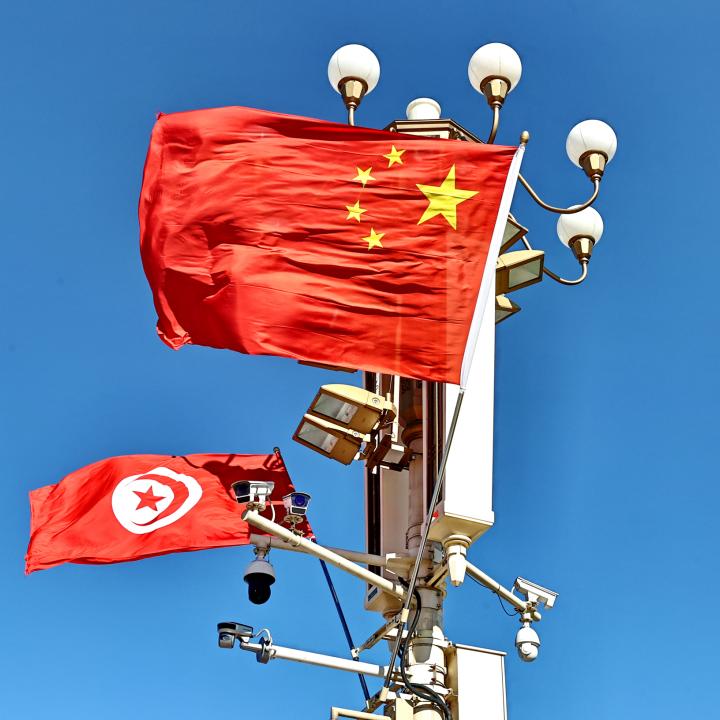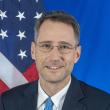
- Policy Analysis
- PolicyWatch 3897
Countering Chinese and Russian Influence in North Africa

The U.S. ambassador to Tunisia joins three Washington Institute experts to discuss the evolution of great power competition in North Africa.
On July 8, The Washington Institute held a virtual Policy Forum with Joey Hood, the U.S. ambassador to Tunisia. He was joined by Grant Rumley, Ben Fishman, and Anna Borshchevskaya, coauthors of the recent Institute study “North Africa in an Era of Great Power Competition.” The following is a rapporteur’s summary of their remarks.
Ambassador Joey Hood
The United States has maintained relationships with countries in North Africa for over 200 years. Today, many of these relationships—particularly with Tunisia—are focused on improving the livelihood of citizens through economic cooperation. The United States is one of the largest importers of Tunisian products such as handicrafts, olive oil, high-end electronics, and clothing, and these industries support thousands of jobs in agriculture and other sectors. In fact, American initiatives have helped create more than 80,000 jobs in Tunisia over the past decade. Additionally, the United States is working directly with small businesses and investing in the country’s energy independence and private-sector development, including sponsorship of a recent conference for women in tech. Tunisia’s population is highly educated—worldwide, it is second only to Malaysia’s in percentage of STEM graduates and has twice the percentage of women in scientific research than the United States. This makes the country even more attractive for American investment.
The importance of the bilateral security partnership cannot be overstated either. Tunisia has suffered several terrorist attacks designed to hurt its tourism industry, while the Islamic State has attempted to capture territory near the Libyan border. In response, Washington has helped Tunis develop its surveillance capabilities on the eastern frontier and provided broad security assistance to its armed forces and the Interior Ministry’s counterterrorism capabilities. Thanks to such assistance, the country is more stable and has been contributing to security and humanitarian relief efforts across Africa.
The U.S. relationship with Tunisia stands in stark contrast to that of Russia and China. While the country has a trade surplus with the United States, it runs a massive trade deficit with the other two powers. Moreover, unlike Washington, Moscow and Beijing do not engage with Tunisia’s civil society or work with its citizenry to address long-term challenges (e.g., helping farmers and fishermen adapt to climate change). A clear look at the facts shows there is nothing to fear from Russian and Chinese competition in Tunisia.
Grant Rumley
From a security standpoint, North African countries continue to feel the effects of challenges such as instability in the Sahel, tensions between Algeria and Morocco, and the ongoing conflict in Libya. These regional challenges are compounded by the global repercussions of the Ukraine war, particularly its effects on the international arms market. Before the war, Russia was one of the world’s largest arms exporters. Since the invasion, however, countries that previously relied on Moscow to arm their militaries have faced difficulties buying new materiel and maintaining the stocks they already have. At the same time, Western partners are being asked to offload older equipment to support Ukraine. Algeria and Morocco embody this divide.
North African countries have experienced a sort of whiplash during this moment of great power competition. For decades, the prevailing belief was that Western economic, political, and diplomatic engagement with China would moderate its foreign policy and bring it into the established global order. Yet Beijing’s actions have changed that calculation, as has Washington’s bipartisan shift toward strategic competition. Countries around the world have been forced to adjust to this new dynamic.
Going forward, the United States should heed the considerations expressed by North African countries and incorporate them into its regional approach. When cultivating security partners in the region, it should formulate parameters for a country’s cooperation with China and convey them in a clear and unified voice. This does not mean that a given country will follow Washington’s China policy exactly, but it does show that the United States cares about maintaining the security partnership and is communicating its concerns proactively.
For countries that are not U.S. security partners, the message should be more straightforward: namely, that certain levels of cooperation with China pose an inherent risk to their sovereignty. Washington should continue to inform and warn these neutral countries about the risks of deepening ties with Beijing, thereby maintaining consistency in its messaging to this important region.
Ben Fishman
The most immediate threat that the United States and NATO face in North Africa is the growing alliance between Russia and Gen. Khalifa Haftar, commander of the so-called Libyan National Army (LNA). Since the demise of Moscow’s top mercenary chief Yevgeny Prigozhin, its relationship with Haftar has become increasingly overt. Today, Russia uses air bases and ports in Haftar-controlled areas of eastern Libya to unload weapons and materiel destined for the Sahel, thereby threatening NATO’s southern flank. The Kremlin’s growing influence is exemplified by Deputy Defense Minister Yunus-Bek Yevkurov’s frequent visits to Libya and Haftar’s 2023 meeting with Vladimir Putin in Moscow. Russia wants continued control of Libyan military bases, access to Haftar-controlled oil zones, and the ability to drive North African migrants toward Europe.
The United States is doing very little to counter this threat, and engaging Haftar has been fruitless. Instead, Washington should sanction the general (and, perhaps, his sons, who have taken a greater role in his affairs) using the Magnitsky Act, which the Obama administration specifically intended for figures who disrupt peace and security in Libya. The general’s cooperation with Russia also gives U.S. officials grounds to consider action against him via the Countering America’s Adversaries Through Sanctions Act (CAATSA). For now, the deep relationship between Russia and Haftar only highlights Washington’s lack of a comprehensive strategy toward such a critical area—though the U.S. government’s progress toward finally establishing a full-time presence in Libya after a decade-long absence is a step in the right direction.
The lack of economic integration in North Africa plays a crucial role in Libya policy as well. A stable Libya could be a source of wider economic prosperity due to its oil wealth. Ramping up production in this sector would benefit the entire region by raising billions of dollars, creating jobs, and stimulating economic relations with Europe, Egypt, and the Maghreb. Libya’s current lack of economic development—a product of corruption, inefficient public spending, and stalled reforms—is astounding for a country with such vast oil wealth. Even after last year’s devastating flood in Darnah brought additional international attention and funding, Libya has seen very little new construction. Elsewhere, the rift between Algeria and Morocco is similarly hampering economic development and integration, costing each country billions of dollars in trade.
Anna Borshchevskaya
By invading Ukraine, Russia has sought to create a new global order that changes the Western security architecture. Although Ukraine is the biggest priority at the NATO summit in Washington this week, the alliance must also look south in order to counter Moscow’s broader strategy. This makes North Africa even more important, as Russian threats continue to build there.
Historically, access to a Libyan port has been a key part of Russia’s larger geostrategic plans, beginning with Joseph Stalin’s failed attempt to secure such rights during the Soviet era. Russia already has significant access to the Mediterranean Sea through its naval base in Tartus, Syria, and its close relationship with Egypt, but it has long hoped to build more influence in the strategically important East Mediterranean. Libya offers the added benefit of a deepwater port.
In addition, Libya’s fragmented political atmosphere is enabling Moscow to gain a foothold in Africa, using the heavy Wagner Group/Africa Corps presence in the country as the tip of the spear. Putin has long viewed Africa as part of Russia’s strategic picture and has been taking more concerted action there during the Ukraine war. Accordingly, the continent can no longer be relegated to the periphery of international relations.
Russia also uses disinformation to shape Africa’s conversation about Ukraine, and unfortunately, perception often matters more than reality. To counter this narrative, the United States should put more effort into its regional messaging. Traditionally, U.S. diplomatic personnel prioritize facts over photo ops and do not seek credit for their activities. Yet the government should take a page from Russia’s playbook by unapologetically promoting U.S. actions in the region and partnering with local media outlets—a highly effective strategy that Moscow employs often.
Washington should simultaneously empower Ukrainians to project their own message into the region. Kyiv understands that it has a narrative problem and is taking steps to counteract it by opening embassies throughout Africa. The United States can boost this effort by facilitating Ukrainian information campaigns that strategically counter Russia’s messaging in the region.
Moscow has also been weaponizing the flow of people from North Africa in a bid to overwhelm and destabilize European countries, which must now deal with migrants from Syria, Ukraine, and African countries. U.S. officials recognize that this is a problem, but they need to work more closely with Europe on building consensus behind a solution.
This summary was prepared by Kyle Robertson. The Policy Forum series is made possible through the generosity of the Florence and Robert Kaufman Family.






